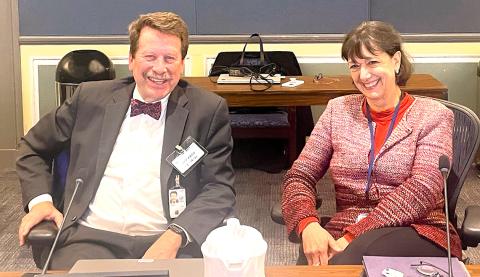NIH, FDA Leaders Gather to Chart Bold Path for Big Initiatives

Photo: ryan bayha
Opening the NIH-FDA Joint Leadership Council (JLC) meeting on Feb. 13, NIH Director Dr. Monica Bertagnolli said, “Rob and I have been waiting for this meeting for a long time!”
The “Rob” she was referring to was FDA Commissioner Dr. Robert Califf, who, with Bertagnolli, co-chairs the JLC, a forum for NIH and FDA institutes and center directors along with leaders in NIH’s Office of the Director to collaborate on big ideas. The council convenes several times a year, or as needed. This was Bertagnolli’s first meeting as NIH director.
The agenda featured discussions on electronic health records, artificial intelligence, increasing clinical trial participation and diversity, and evidence generation.
While exchanging information with FDA colleagues is always beneficial, JLC is also built to take bold actions. Currently its working groups are
- developing new approaches to help individuals of all ages stop using tobacco products
- investigating questions to inform regulatory decisions related to nutrition
- developing a glossary of inconsistent and/or ambiguous clinical research terms
Leaders of both agencies agreed to create a new working group to generate evidence on developing a “National Problem List” of high-priority, unanswered questions in clinical practice. This ambitious goal will also feature extensive collaboration with colleagues at the Centers for Disease Control and Prevention, Centers for Medicare and Medicaid Services (CMM), Office of the National Coordinator for Health Information Technology and many other federal agencies.
“These efforts represent an unprecedented scope and there is an urgent need to understand the optimal use of health interventions in real-world practice,” said Califf about the potential impact the evidence-generation group could have.
Enthusiasm among attendees was evident during discussions. Closing the meeting, Bertagnolli echoed the thoughts of many in the room, “Ok, let’s get to work!”
NIH also maintains a JLC with CMM. To learn more, contact Ryan Bayha at bayhar@mail.nih.gov in the NIH Office of Science Policy.
